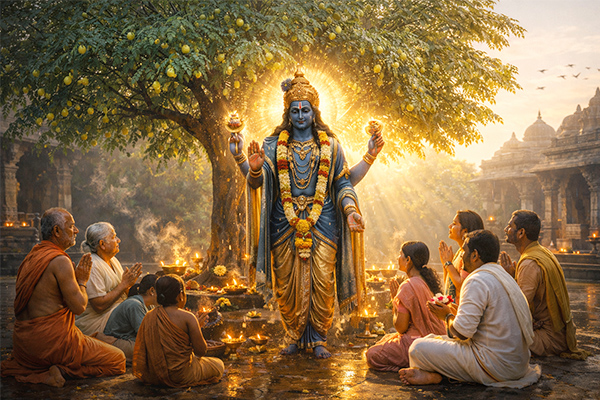
Amalaki Ekadashi shines as a day of divine blessings and spiritual renewal. This year, it graces us on Monday, March 10th, falling on the Ekadashi tithi (11th day) of the Shukla Paksha (waxing phase of the moon) in the month of Phalguna. Dedicated to the worship of the Amalaki tree (Indian gooseberry) a revered symbol of vitality and purity and to Bhagwan Vishnu , the preserver of the universe, this day is a celestial occasion for devotees to deepen their connection with the divine. As devotees prepare for the vibrant colors of Holi and reflect on the transformative energy of Maha Shivratri, Amalaki Ekadashi offers a serene pause for introspection and devotion. This day is a reminder of the harmony between humanity and nature, where the divine manifests in every living being and the cycles of life echo eternal truths. Amalaki, also called Amalaka ekadashi Ekadashi serves as a gentle call to align our thoughts and actions with spiritual ideals, fostering balance and inner peace.
Festival Date, Time, Muhurat & Tithi
Amalaki Ekadashi will be observed on Friday, February 27, 2026.
Key Timings for Amalaki Ekadashi 2026:
On 28 th Feb, Parana Time - 06:59 AM to 09:20 AM
On Parana Day Dwadashi End Moment - 08:43 PM
Ekadashi Tithi Begins - 12:33 AM on Feb 27, 2026
Ekadashi Tithi Ends - 10:32 PM on Feb 27, 2026
Please note that the
Parana
should be done after sunrise and within the Dwadashi Tithi to complete the Ekadashi fast appropriately.
Note: Sunrise and sunset vary by region and date due to India's geographical diversity. For exact timings, refer to local astronomical data.
Significance & Importance of Amalaki Ekadashi
The significance of Amalaki Ekadashi finds its roots in the Brahmanda Purana, which extols the observance of this day as a means to dissolve sins, accumulate divine merit, and ultimately attain moksha (liberation). The Amalaki tree, regarded as an earthly manifestation of Bhagwan Vishnu, becomes the centerpiece of the rituals performed on this day, symbolizing the harmony between nature and the divine. This day is dedicated to Bhagwan Vishnu, the eternal preserver of the universe, and the Amalaki tree (Indian gooseberry), revered as his earthly manifestation. Worshiping this sacred tree on Amalaki Ekadashi is believed to bestow good health and provide spiritual awakening. The rituals performed on this day remind devotees of their interconnectedness with the cosmos and the divine presence that permeates all life.
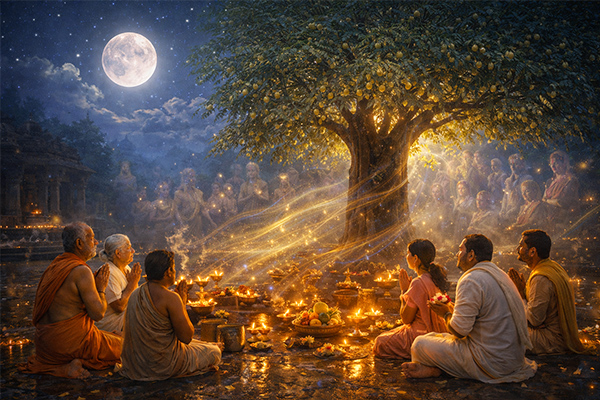
The fast observed on Amalaki Ekadashi is not merely a physical discipline but a profound act of surrender and devotion. By abstaining from worldly pleasures and focusing on prayers, meditation, and chanting the holy names of Vishnu, devotees purify their minds and hearts. The vrata (fast) is believed to burn away negative karma accumulated over lifetimes, paving the way for spiritual liberation, or moksha. The act of fasting is complemented by the offering of fruits, lamps, and flowers at the base of the Amalaki tree, symbolizing gratitude and reverence for the divine forces that sustain life. This sacred practice serves as a reminder to lead a life of humility, compassion, and devotion, qualities that are the essence of dharma.
Furthermore, the spiritual energy of Amalaka ekadashi is amplified by its association with the waxing phase of the moon, which signifies growth, renewal, and positive transformation. It is said that the blessings received on this day extend beyond the individual, benefiting their ancestors and future generations. As the chants of Vishnu's names resonate and the sacred rituals unfold, devotees feel a profound sense of divine grace enveloping their lives. Amalaka ekadashi is not just a day of rituals but a celebration of the eternal truths that guide humanity—reminding us to embrace the virtues of selflessness, gratitude, and harmony with the divine order of the universe.
Stories of Amalaki Ekadashi Festival
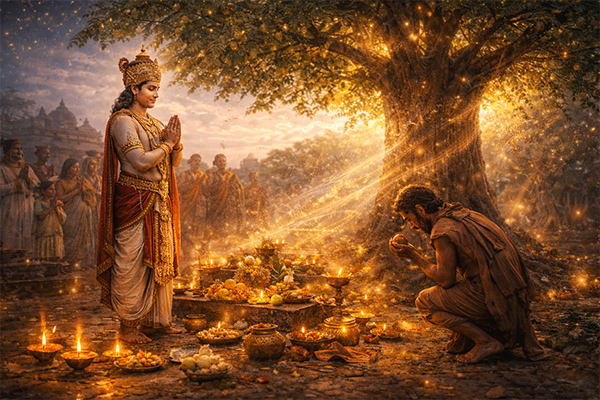
These timeless stories weave a rich tapestry of faith, grace, and divine compassion around Amalaki Ekadashi's profound spirituality. They remind us that no devotion is too small, heart too simple, or soul too lost for God's boundless mercy. Even a small act of faith, like a humble offering, an unintentional fast, or a prayer, can connect us to the eternal. These stories teach us humility, purity, and faith in the divine's infinite compassion, which uplifts and redeems all who seek refuge.
The King and the Tribal Devotee: A Tale of Humble Devotion
In the prosperous kingdom of Vaidish, King Chitrasena was renowned for his righteousness and unwavering devotion to Bhagwan Vishnu. Every year, on the sacred day of Amalaki Ekadashi, the king led his subjects to a grand ceremonial gathering under the revered Amalaki tree, believed to be a divine embodiment of Vishnu himself. With fervent prayers, offerings of fruits, lamps, and flowers were made, and hymns resonated through the air, filling every heart with piety.
One year, amidst this sacred celebration, a tribal wanderer stumbled upon the gathering. He was a man of simple means, untouched by the intricacies of religious rituals, yet profoundly moved by the atmosphere of devotion. Overwhelmed by an inexplicable sense of reverence, he plucked a small fruit from his bag and offered it to the Amalaki tree, bowing his head in humility. Though his offering was modest, it carried the weight of his pure heart and untainted faith.
Years later, when the tribal man’s earthly life ended, he found himself welcomed into Vaikuntha, Vishnu’s celestial abode. The Bhagwan himself revealed that the simple yet heartfelt act of devotion on Amalaki Ekadashi had absolved him of all sins and granted him liberation. This tale immortalizes the truth that the sincerity of one’s heart far outweighs the grandeur of rituals in the eyes of the divine.
The Merchant Saved by Divine Grace
Long ago, in a bustling city of merchants and trade, there lived a wealthy but selfish trader named Dhanapala. He was consumed by greed and had little time for spiritual pursuits. One fateful day, while traveling through a dense forest with his caravan, robbers ambushed him, leaving him beaten and unconscious under a sprawling Amalaki tree. His wealth and pride could not save him from this misfortune, and the forest grew eerily silent as night fell.
Unbeknownst to him, the day was Amalaki Ekadashi, and the sacred tree under which he lay was imbued with the divine essence of Bhagwan Vishnu. Protected by its spiritual energy, the merchant was shielded from further harm as wild animals and natural dangers mysteriously kept their distance. When he regained consciousness at dawn, Dhanapala felt an overwhelming sense of gratitude and peace that he had never experienced before.
This transformative moment marked the beginning of a new chapter in his life. Abandoning his greed, the merchant dedicated himself to acts of charity and the worship of Vishnu, vowing to honor Amalaki Ekadashi every year. His story illustrates how even the unworthy, through divine grace, can find redemption and spiritual awakening when they turn toward the path of righteousness.
The Woodcutter’s Redemption: The Unseen Hand of the Divine
In a small village nestled at the edge of a vast forest, lived a humble woodcutter named Raghava. His days were spent chopping wood to earn a meager livelihood, and his nights passed in quiet solitude. Unbeknownst to him, his life was intertwined with the divine. Each year, on Amalaki Ekadashi, he unknowingly fasted, as he often had no food to eat that day. Though unaware of its spiritual significance, his simplicity, hard work, and unintentional observance of the vrata earned him immense divine merit.
As years passed, Raghava’s life came to an end, and the messengers of Yama, the god of death, appeared to claim his soul. However, before they could take him, Vishnudutas, the celestial messengers of Bhagwan Vishnu, descended with radiant glory. They declared that Raghava’s pure heart and unwitting observance of Amalaki Ekadashi had granted him a place in Vaikuntha, Vishnu’s eternal abode.
Awestruck, Raghava humbly accepted his fate, realizing that even without consciously seeking it, his simplicity and quiet devotion had drawn the Bhagwan’s grace. This tale reminds us that the divine is ever-watchful, rewarding even the smallest acts of virtue and devotion, whether performed knowingly or unknowingly.
What to do on Amalaka Ekadashi
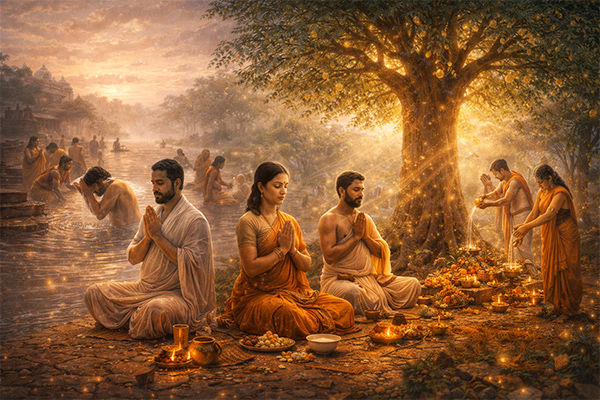
Amalaki Ekadashi begins with devotees rising early to take a ritualistic bath, symbolizing the purification of the body and soul. Wearing fresh clothes, they prepare a serene space for worship, ensuring the atmosphere reflects peace and devotion, paving the way for spiritual reflection and rituals.
Fasting is a central aspect of Amalaka Ekadashi, representing self-discipline and surrender to the divine. Devotees abstain from grains and heavy foods, opting for fruits and milk or observing a complete fast, depending on their physical capacity. The vrata is more than a physical act; it emphasizes mental purity, encouraging participants to abstain from anger, negativity, and worldly distractions. This fasting is complemented by prayers and meditation, allowing devotees to focus entirely on seeking Bhagwan Vishnu’s blessings and aligning their actions with the principles of dharma.
A key ritual on this day is the worship of the Amalaki tree, which symbolizes purity, vitality, and the sacred bond between humanity and nature. Under the tree’s shade, devotees offer water, flowers, and sacred threads while reciting hymns and prayers in honor of Bhagwan Vishnu. For those unable to worship an actual tree, symbolic offerings at home are equally meaningful, reflecting the essence of reverence and gratitude. The Amalaki tree represents the interconnectedness of all life, reminding devotees of the harmony that exists between the divine, nature, and humanity.
Devotional practices extend beyond personal rituals, as Amalaka ekadashi is also a day of charity and compassion. Devotees engage in acts of kindness, such as donating food, clothes, or money to the needy, and feeding animals, which is seen as a way to honor the divine presence in all living beings. Many also observe a night vigil, chanting hymns and singing bhajans to deepen their spiritual connection. Staying awake through the night symbolizes heightened awareness and a surrender to the God, culminating in a transformative experience of divine grace.
The fast concludes the next morning, on Dwadashi tithi, with a simple and sattvic meal taken after prayers. By observing the rituals with sincerity, humility, and devotion, Amalaka ekadashi becomes more than a festival; it becomes a journey of spiritual renewal, purification, and divine alignment. The day serves as a reminder that the path to liberation lies in selflessness, gratitude, and an unwavering connection to the divine, offering devotees the opportunity to elevate their consciousness and find harmony with the eternal truths of existence.
Amalaki Ekadashi Festival Puja Vidhi (Puja Procedure)
_205181.jpg)
The Amalaki Ekadashi festival holds immense spiritual importance for devotees of Bhagwan Vishnu, with the Puja Vidhi (Puja Procedure) involving detailed rituals to honor the Amalaki tree and Bhagwan Vishnu, seeking blessings for health, prosperity, and liberation. The following is the step-by-step procedure for observing the Puja during Amalaki Ekadashi:
- Preparation of Sacred Space: The day of Amalaki Ekadashi begins with cleaning the house and the area where the Puja will take place. This space should be free of distractions, creating an atmosphere conducive to worship. Arrange a clean mat or cloth on the floor and set up a small altar or platform with the idol or picture of Bhagwan Vishnu and, if possible, near an Amalaki tree (Indian gooseberry), which is central to the celebration.
- Morning Bath and Purification: Devotees should take an early morning bath, ideally before sunrise, to cleanse both body and mind. This ritual purifies the devotee and prepares them spiritually for the day’s observances. Wearing fresh, clean clothes after the bath symbolizes physical and mental purity.
- Lighting of the Lamp and Incense: Once the sacred space is ready and the devotee has bathed, light a small oil lamp (diya) and place it in front of Bhagwan Vishnu’s image or the Amalaki tree. Incense sticks are also lit to create a serene and sacred atmosphere. The lamp signifies the removal of ignorance and darkness, while the incense enhances the spiritual energy of the space.
- Offer Fresh Flowers, Fruits, and Tulsi Leaves: Devotees offer fresh flowers like marigolds, roses, or jasmine, along with Tulsi leaves, which are highly sacred to Bhagwan Vishnu. If performing the Puja near an Amalaki tree, devotees also adorn the tree with flowers and sacred threads. These offerings represent devotion, purity, and gratitude, and the Tulsi leaves are believed to hold divine purifying powers.
- Offering Fruits, Sweets, and Water: Fresh fruits such as bananas, apples, and guavas, along with sweets like laddus or kheer, are offered to Bhagwan Vishnu and the Amalaki tree. These symbolize abundance, the sweetness of devotion, and gratitude for divine blessings. Devotees also offer water as a gesture of humility and surrender.
- Recitation of Mantras: The Puja involves the chanting of sacred mantras dedicated to Bhagwan Vishnu. Devotees often recite the Vishnu Sahasranama (1,000 names of Vishnu) or the Hare Krishna Maha Mantra. Chanting these mantras with concentration invokes divine blessings, purifies the mind, and deepens the devotee’s connection to the divine.
- Reading or Listening to Sacred Texts: Devotees may read or listen to scriptures like the Bhagavad Gita, Vishnu Purana, or stories of Amalaki Ekadashi from the Brahmanda Purana. Reflecting on these texts enhances spiritual understanding and reinforces devotion by highlighting the qualities and glories of Bhagwan Vishnu.
- Fasting and Self-Discipline: Fasting is an integral part of Amalaki Ekadashi and is observed to promote self-discipline and spiritual growth. Devotees may observe a nirjala vrat (complete fast without water) or consume only fruits and milk. This fasting practice helps purify the body and mind, enabling the devotee to focus on spiritual activities and detach from worldly distractions.
- Evening Aarti and Bhajans: In the evening, devotees perform Aarti, waving a lit oil lamp in front of Bhagwan Vishnu’s image or the Amalaki tree while singing devotional hymns and bhajans. The Aarti is an expression of deep respect and love, inviting divine grace and protection into the home while creating an atmosphere of spiritual upliftment.
- Breaking the Fast (Parana): The fast is traditionally broken the following morning, on Dwadashi, at an auspicious time (Parana), typically after sunrise. Devotees break their fast with light, sattvic foods such as fruits, milk, or simple grains, expressing gratitude to Bhagwan Vishnu for the strength and focus needed to complete the fast.
By following these steps, devotees not only observe the traditional rituals of Amalaki Ekadashi but also deepen their bond with Bhagwan Vishnu. Each prayer, offering, and act of devotion purifies the heart, invites divine blessings, and fosters spiritual growth, ultimately aligning the devotee with the eternal truths of dharma and liberation.
Amalaki Ekadashi Puja Mantras
Amalaki Tree Mantra
“Om Amalakiya Namah”
This simple mantra is chanted while worshiping the Amalaki tree, symbolizing reverence and gratitude to the sacred tree, believed to embody Bhagwan Vishnu’s essence.
Vishnu Mantra
“Om Namo Bhagavate Vasudevaya”
Meaning:
“I bow down to Bhagwan Vasudeva (another name for Vishnu), the sustainer of the universe.”
Amalaki Ekadashi Vrat Vidhi (Fasting Procedure)
_205182.jpg)
The Amalaki Ekadashi Vrat Vidhi is a sacred observance performed with devotion and discipline to seek blessings from Bhagwan Vishnu and achieve spiritual purification. The fasting procedure can be conducted as follows:
Preparatory Rituals (Before the Fast Begins)
- Morning Bath and Purification: Begin the day early, ideally before sunrise, with a ritualistic bath. This act symbolizes the cleansing of both body and soul, preparing you for the day’s spiritual observance. Use clean clothes and ensure your surroundings are tidy and serene.
- Setting Up the Puja Space: Arrange a sacred space for worship by placing an idol or picture of Bhagwan Vishnu on a clean altar. If possible, perform the rituals near an Amalaki tree, or place its symbolic representation on the altar.
- Sankalp (Vow): Take a solemn vow (sankalp) to observe the fast with full devotion and dedication. This is done by praying to Vishnu, stating your intention to fast, and seeking his blessings for strength and guidance.
- Avoidance of Tamasik Foods: Starting from the previous evening, abstain from consuming tamasik (impure) foods such as onion, garlic, meat, or alcohol, as they are considered spiritually impure.
Observing the Fast (During the Day of Ekadashi)
- Complete or Partial Fast: Depending on your capacity, observe either a nirjala vrat (complete fast without food or water) or a phalahar vrat (fasting with fruits, milk, and water). Avoid grains, pulses, and cereals throughout the day, as they are prohibited during Ekadashi fasting.
- Engage in Devotion: Dedicate the day to spiritual practices such as chanting Vishnu mantras (e.g., Om Namo Bhagavate Vasudevaya), reciting the Vishnu Sahasranama, and meditating on the divine. Performing puja to the Amalaki tree or Bhagwan Vishnu with offerings of flowers, fruits, and Tulsi leaves is highly auspicious.
- Avoid Distractions: Refrain from negative activities such as gossip, anger, or material indulgence, focusing entirely on spiritual growth and inner peace. Spend time reading scriptures like the Bhagavad Gita or listening to stories of Amalaki Ekadashi from the Puranas.
Breaking the Fast (Parana)
- Timing: The fast should be broken on the Dwadashi Tithi (12th lunar day) the next morning, within the prescribed Parana time, after sunrise. Consult a Panchang (Hindu calendar) for the exact timing at your location.
- Light Meal: Break the fast with a light, sattvic meal consisting of fruits, milk, or simple grains. Avoid heavy or tamasik foods to maintain the purity of the vrat.
- Express Gratitude: Conclude the vrat by offering prayers of gratitude to Bhagwan Vishnu, seeking his blessings for spiritual growth, protection, and liberation. Reflect on the purpose of the fasting and carry its spiritual essence forward in your daily life.
By observing the vrat with sincerity and devotion, devotees can purify their hearts, strengthen their connection with Bhagwan Vishnu, and attain his divine grace.
Amalaka Ekadashi Vrat Katha (Traditional Fasting Story)
_205178.jpg)
The vrat katha of Amalaka ekadashi, drawn from the Brahmanda Purana, is a testament to the profound blessings and transformative power of devotion to Bhagwan Vishnu. Sage Vashishta narrated this tale to King Madhata, describing the spiritual significance of this auspicious day.
Once upon a time, in the kingdom of Vaidika, ruled by the righteous King Chitraratha, the people were deeply devoted to Bhagwan Vishnu. The kingdom thrived in harmony, intelligence, and spiritual discipline, with every citizen observing Ekadashi fasts diligently. On a particularly sacred Amalaka ekadashi, the tithis of Ekadashi and Dwadashi conjoined, amplifying its spiritual potency. King Chitraratha led his citizens to a temple nestled in the forest, where he planted and worshipped an Amalaki tree, revered as the offspring of Bhagwan Brahma and a manifestation of Bhagwan Vishnu himself. The king and his people offered ghee lamps, flowers, fruits, and other offerings to the tree, acknowledging its sacredness. With unwavering devotion, they prayed, circumambulated the tree, and spent the night singing hymns and glorifying Vishnu.
That same night, a sinful hunter, ignorant of spiritual practices, stumbled upon the gathering. Mesmerized by the radiant sight of the illuminated temple and the devotional atmosphere, he lingered, listening to the hymns and staying awake until dawn. Though unintentional, his presence amidst such devotion bore unforeseen consequences. The hunter's death led to his rebirth as Vasuratha, the noble and fearless son of King Viduratha of Jayanti. Blessed with unmatched valor, intelligence, and devotion, Vasuratha became a just and compassionate ruler, performing enormous sacrifices in honor of Vishnu.
One day, while hunting in the forest, King Vasuratha lost his way and fell asleep under a tree. A group of tribesmen, enemies of the king, found him and plotted his death. However, as they raised their weapons, a radiant, divine woman emerged from Vasuratha’s body. Fierce and armed with a blazing discus, she struck down the tribesmen, saving the king. When Vasuratha awoke, he was astonished to see his enemies defeated. A celestial voice from the sky revealed that it was none other than Bhagwan Vishnu, who had protected him due to his unwavering devotion and merits earned by observing Amalaka ekadashi, even in his past life as the hunter.
The katha concludes with Sage Vashishta explaining to King Madhata that observing Amalaka ekadashi—whether knowingly or unknowingly—has the power to cleanse all sins, protect the devotee, and bestow a place in Vaikuntha, at the lotus feet of Bhagwan Vishnu. It is a reminder that even the smallest acts of devotion, if sincere, carry immense spiritual rewards and divine grace.
Puja Utensils, Essentials

Rudra Centre brings an extensive collection of Puja Articles which caters to all that is required for daily and special Puja Vidhis. We offer variants of designs and sizes in each category. The list includes handcrafted Puja Mandirs, Puja Pedestals, offering Bowls, Panchpatra, intricately carved Puja Thalis, Abhishek Vessels, in different materials, Pure Silver/German Silver articles like Kalash, set of Shodash Upachara and Several other Puja Articles, which we deliver at your doorstep.
Visit the complete collection:
All Ekadashi (Gyaras) Vrat Kathas
-Vrat-Kathas_205177.jpg)
Ekadashi is an auspicious day dedicated to Bhagwan Vishnu on the eleventh day of every lunar fortnight in traditional Hindu calendar. It occurs twice a month, once during Shukla Paksha and the other during Krishna Paksha.
Benefits:
- For health, wealth and success
- For fulfillment of wishes
- For spiritual upliftment
- For blessing of Bhagwan Vishnu
Puja Service Includes:
Ganpati invocation mantra, Invocation mantras of all major deities, Dhyaan, Katha of Vishnu, Aarti, Pushpaanjali, Prasadam.
Buy here:
Conclusion
Amalaki Ekadashi is a celebration of purity, spiritual renewal, and the eternal grace of the divine. This sacred day honors the sacredness of the Amalaki tree and the boundless compassion of Bhagwan Vishnu. Through fasting, prayers, and acts of devotion, devotees reconnect with the principles of humility, self-discipline, and harmony with nature, seeking blessings for the purification of the soul and the attainment of spiritual liberation. As the sacred hymns echo and the presence of Bhagwan Vishnu permeates the atmosphere, this auspicious day becomes a moment of deep devotion and reflection, reminding us that true peace and fulfillment come from faith, gratitude, and the alignment of our actions with the divine will.


-in-Astrology.jpg)
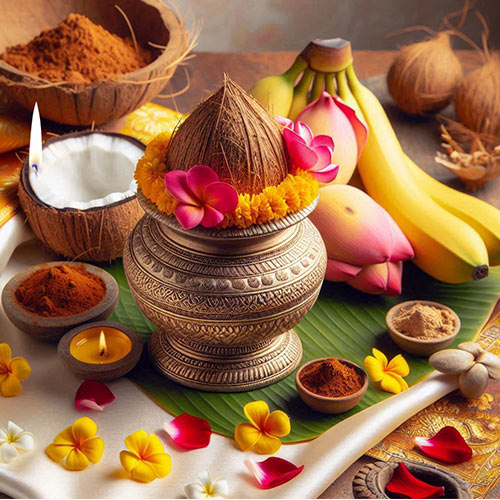
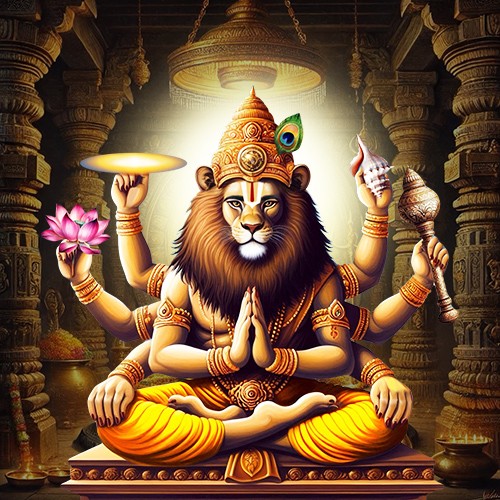
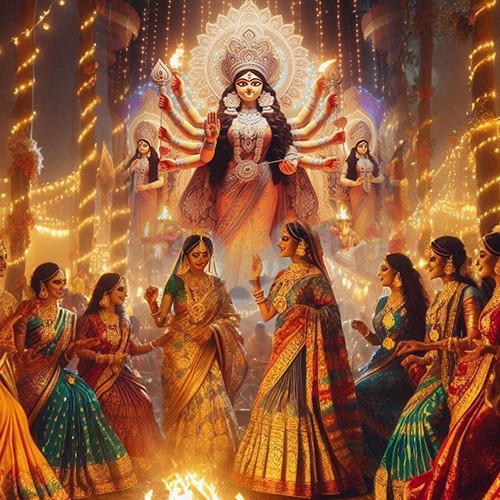
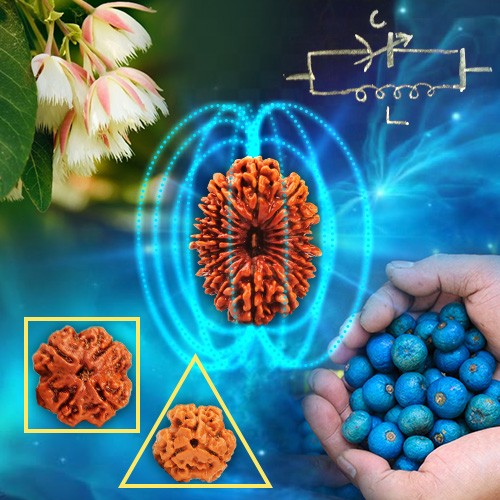

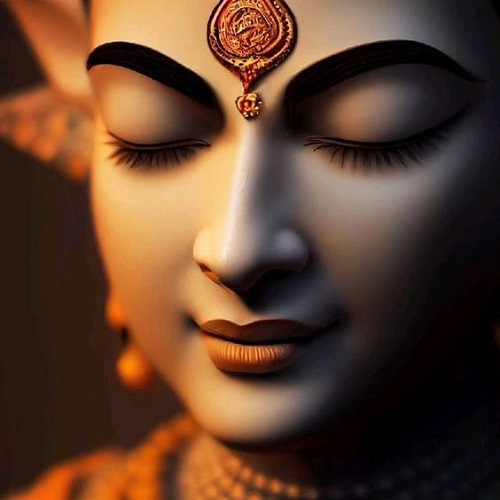
.jpg)
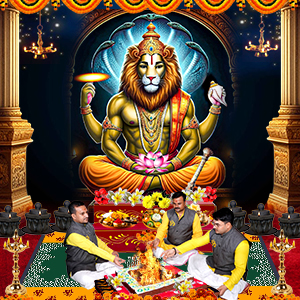
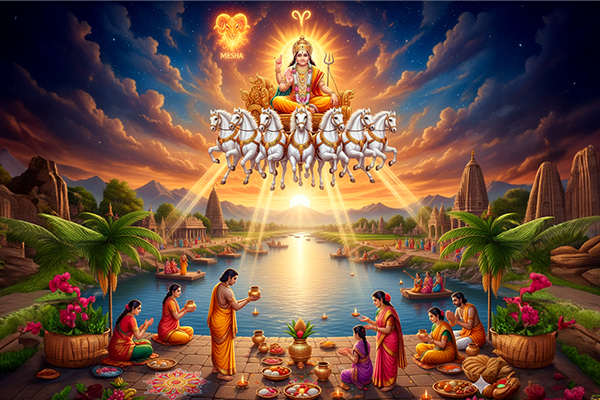
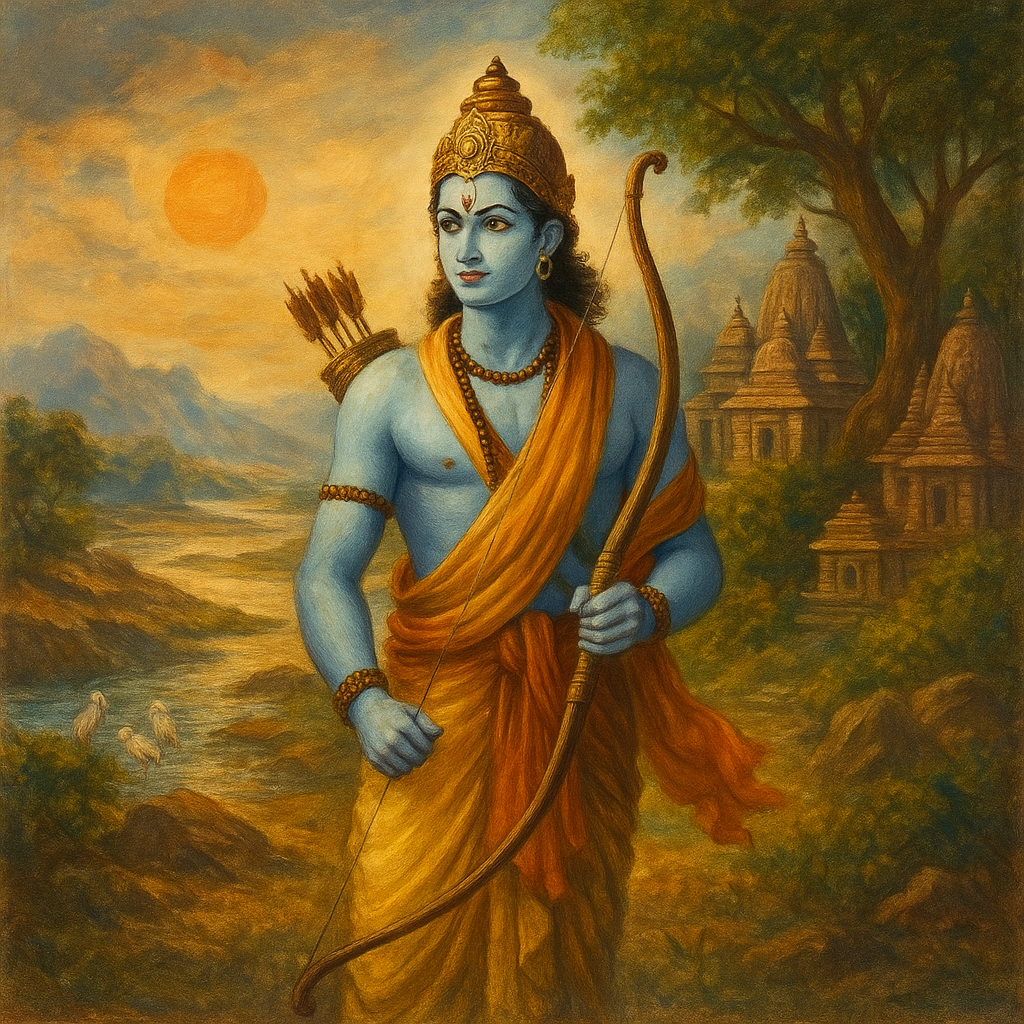
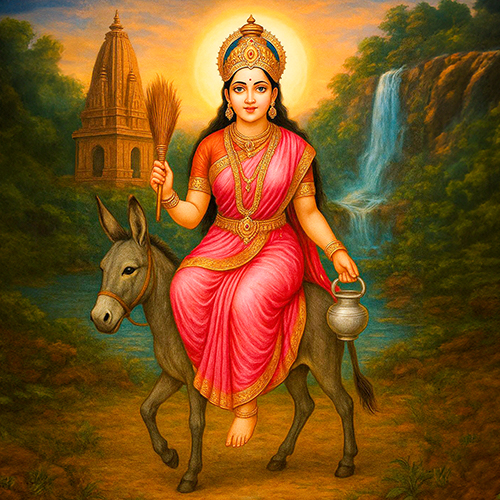
Comments 0
Leave your thought here